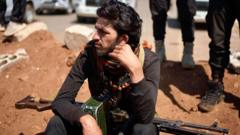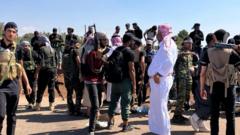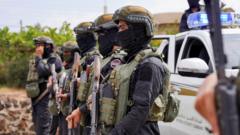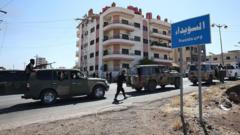Doctors and witnesses describe a harrowing scene of death as they recount the government's alleged massacre of patients, sparking outrage and calls for accountability.
Claims of Bloody Hospital Massacre in Suweida Amid Sectarian Violence

Claims of Bloody Hospital Massacre in Suweida Amid Sectarian Violence
New accounts from Suweida, Syria, illustrate a brutal government assault on a local hospital amidst escalating violence in the region.
In a shocking report, the BBC has uncovered chilling testimonies from Suweida's National Hospital, where Syrian government forces are accused of perpetrating a massacre during recent sectarian violence. As conflict escalates in the Druze-majority province, eyewitnesses describe the horrific atmosphere at the hospital, marked by the stench of death and visible bloodshed.
Entering the hospital premises, the sight of numerous decomposing bodies laid out in white bags greets reporters and medical staff alike. Dr. Wissam Massoud, a neurosurgeon at the facility, firmly declares, "It was a massacre." He recounts how soldiers entered with the pretext of restoring order, only to unleash terror, targeting vulnerable patients in their beds. "They killed scores of patients, from the very young to the very old," he shared, painting a grim picture of the events that unfolded.
In videos shared by Dr. Massoud, the aftermath of the attack reveals patients left lifeless in their blood-stained sheets, further corroborating allegations of atrocities committed by the Syrian military against the Druze community. Volunteer Kiness Abu Motab poignantly questions the rationale behind the killings, saying, "What is their crime? Just for being a minority in a democratic country?"
Local residents echo these sentiments, expressing fear and mistrust towards the government. Osama Malak, an English teacher, recounted the heartbreaking incident of an eight-year-old disabled boy shot in the head, emphasizing the violation of the protected status of hospitals according to international law. As fighting continues, accusations of each faction committing atrocities proliferate, with many deeming the Syrian army's actions particularly egregious.
While preliminary accounts from eyewitnesses suggest that the death toll may exceed 300, this number remains unverified. In response to the allegations, the Syrian defense ministry acknowledged reports of "shocking violations" and has committed to investigating the claims.
Restricted access to Suweida city complicates efforts to gather comprehensive evidence regarding the events that transpired. The situation remains tense as government forces enforce a de facto siege, limiting movement within the city and surrounding areas. Despite government advances in Druze territories, the city itself, home to over 70,000 residents, remains largely under Druze control.
Among the survivors is eight-year-old Hala al-Khatib, who was seriously injured while taking refuge during the attack. With a bandaged face and an injured eye, Hala unknowingly faces a future without her parents, victims of this latest wave of violence. The recent bloodbath has garnered attention from the United Nations, which has reported credible allegations of summary executions amidst the ongoing conflict, leaving the fate of the Druze community increasingly precarious.





















